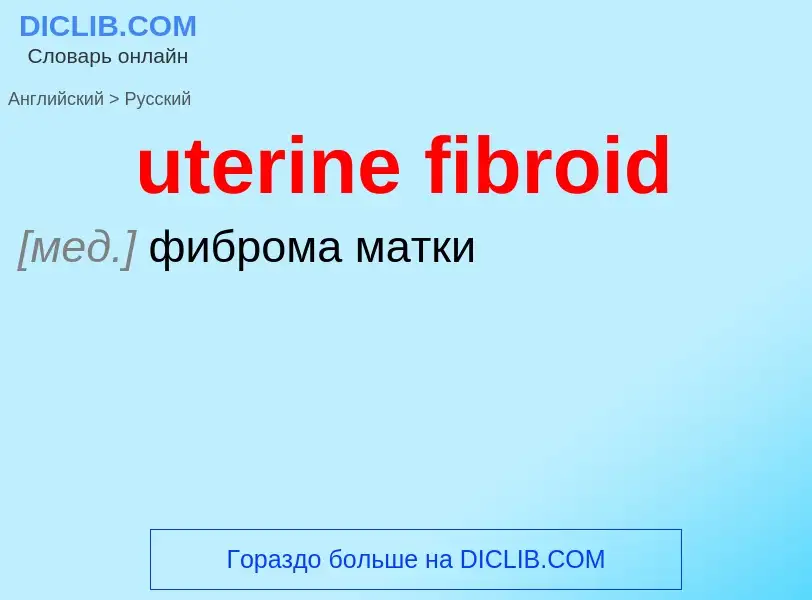Vertaling en analyse van woorden door kunstmatige intelligentie ChatGPT
Op deze pagina kunt u een gedetailleerde analyse krijgen van een woord of zin, geproduceerd met behulp van de beste kunstmatige intelligentietechnologie tot nu toe:
- hoe het woord wordt gebruikt
- gebruiksfrequentie
- het wordt vaker gebruikt in mondelinge of schriftelijke toespraken
- opties voor woordvertaling
- Gebruiksvoorbeelden (meerdere zinnen met vertaling)
- etymologie
uterine fibroid - vertaling naar russisch
медицина
камень матки
медицина
маточное дисфункциональное кровотечение
Definitie
Wikipedia

Uterine fibroids, also known as uterine leiomyomas or fibroids, are benign smooth muscle tumors of the uterus. Most women with fibroids have no symptoms while others may have painful or heavy periods. If large enough, they may push on the bladder, causing a frequent need to urinate. They may also cause pain during penetrative sex or lower back pain. A woman can have one uterine fibroid or many. Occasionally, fibroids may make it difficult to become pregnant, although this is uncommon.
The exact cause of uterine fibroids is unclear. However, fibroids run in families and appear to be partly determined by hormone levels. Risk factors include obesity and eating red meat. Diagnosis can be performed by pelvic examination or medical imaging.
Treatment is typically not needed if there are no symptoms. NSAIDs, such as ibuprofen, may help with pain and bleeding while paracetamol (acetaminophen) may help with pain. Iron supplements may be needed in those with heavy periods. Medications of the gonadotropin-releasing hormone agonist class may decrease the size of the fibroids but are expensive and associated with side effects. If greater symptoms are present, surgery to remove the fibroid or uterus may help. Uterine artery embolization may also help. Cancerous versions of fibroids are very rare and are known as leiomyosarcomas. They do not appear to develop from benign fibroids.
About 20% to 80% of women develop fibroids by the age of 50. In 2013, it was estimated that 171 million women were affected worldwide. They are typically found during the middle and later reproductive years. After menopause, they usually decrease in size. In the United States, uterine fibroids are a common reason for surgical removal of the uterus.


![[[Micrograph]] of a lipoleiomyoma, a type of leiomyoma. [[H&E stain]]. [[Micrograph]] of a lipoleiomyoma, a type of leiomyoma. [[H&E stain]].](https://commons.wikimedia.org/wiki/Special:FilePath/Lipoleiomyoma2.jpg?width=200)



![Submucosal fibroid in [[hysteroscopy]] Submucosal fibroid in [[hysteroscopy]]](https://commons.wikimedia.org/wiki/Special:FilePath/Myoma.jpg?width=200)
![Treatment of an intramural fibroid by [[laparoscopic surgery]] Treatment of an intramural fibroid by [[laparoscopic surgery]]](https://commons.wikimedia.org/wiki/Special:FilePath/Myomenukleation.jpg?width=200)
![After treatment of an intramural fibroid by [[laparoscopic surgery]] After treatment of an intramural fibroid by [[laparoscopic surgery]]](https://commons.wikimedia.org/wiki/Special:FilePath/Myomenukleation1.jpg?width=200)

![A very large (9 cm) fibroid of the uterus which is causing [[pelvic congestion syndrome]] as seen on CT A very large (9 cm) fibroid of the uterus which is causing [[pelvic congestion syndrome]] as seen on CT](https://commons.wikimedia.org/wiki/Special:FilePath/9cmFibroidPelvicCongestionS.png?width=200)
![A very large (9 cm) fibroid of the uterus which is causing pelvic congestion syndrome as seen on [[ultrasound]] A very large (9 cm) fibroid of the uterus which is causing pelvic congestion syndrome as seen on [[ultrasound]]](https://commons.wikimedia.org/wiki/Special:FilePath/9cmFibroidUS.png?width=200)

![A small uterine fibroid seen within the wall of the [[myometrium]] on a cross-sectional ultrasound view A small uterine fibroid seen within the wall of the [[myometrium]] on a cross-sectional ultrasound view](https://commons.wikimedia.org/wiki/Special:FilePath/UterineFirboid.png?width=200)




![This variant of [[Van Gieson's stain]] distinguishes muscle (yellow) from connective tissue (red). This variant of [[Van Gieson's stain]] distinguishes muscle (yellow) from connective tissue (red).](https://commons.wikimedia.org/wiki/Special:FilePath/Histopathology of uterine leiomyoma (Van Gieson's stain).jpg?width=200)
